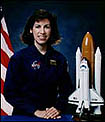People |
Meet
Dr. Ellen Ochoa: Atlantis Shuttle Mission STS-56 |
 |
| One of my primary jobs on the
shuttle was to handle the science experiments and to make
sure that they were operating correctly. And in the film
you will see a group of experiments outside the shuttle
in the payload bay that are taking the measurements that
I was referring to. ground is a way of connecting the
data and the power to the instruments in the bay so we
don’t have to go out and operate them. And there was a group from the German Space Agency as well as NASA that got together and developed what they called a space-slab system that allows any set of instruments no matter what they are doing to let them be hooked into a particular palette or piece of equipment that we take up and then from the shuttle we are able to provide it with power. We’ll be able to send computer commands to the experiments and the experiments will be able to send data back to us. And we can do that remotely, so that is one thing that had to be developed for us to be able to do experiments in space.
STS-56 crewmembers pose for onboard (inflight) portrait on the aft flight deck of Discovery, Orbiter Vehicle (OV) 103. In front are Commander Kenneth Cameron (left) and Mission Specialist 1 (MS1) Michael Foale. In back are (left to right) MS3 Ellen Ochoa, Pilot Stephen S. Oswald, and MS2 Kenneth D. Cockrell. The crew is positioned next to the onorbit station with the Earth's blue and white surface appearing in overhead windows W7 and W8 above them. A 35mm camera with a 20mm lens was used to expose this frame. STS-56 onorbit view of Discovery's OV-103's, payload bay with ATLAS-2 pallet
During STS-56, the Atmospheric Laboratory for Applications and Science 2 (ATLAS-2) unpressurized spacelab pallet and its experiment equipment was documented in the payload bay (PLB) of Discovery, Orbiter Vehicle (OV) 103. ATLAS-2 equipment and instruments include: the igloo (center foreground, only the top is visible); the inverters and pump package (far right); port conical scan sensor (next to pump package at far right); the millimeter-wave atmospheric sounder (MAS) antenna (dish-shaped device at pallet center); the starboard conical scan sensor (small cylinder at far left); and the atmospheric trace module spectroscopy (ATMOS) (box behind conical sensor at far left). Smaller ATLAS-2 instruments located in the center of the pallet include (left to right): Active Cavity Radiometer Irradiance Monitor (ACRIM or ACR); Solar Constant Instrument (SOLCON); Solar Spectrum Instrument (SOLSPEC); and MAS (large box just below antenna). The Shuttle Pointed Autonomous Research Tool for Astronomy 201 (SPARTAN-201) is missing as it was in the midst of separation from OV-103 when the photo was made. The remote manipulator system (RMS) is deployed from its location on the port sill longeron. The PLB aft bulkhead, the vertical tail, and the orbital maneuvering system (OMS) pods backdropped against the Earth limb complete the scene. |
||
[
Meet Dr. Ellen Ochoa ]
[ Impacto, Influencia, Cambio ]
[ History of Science, Technology
and Invention ]